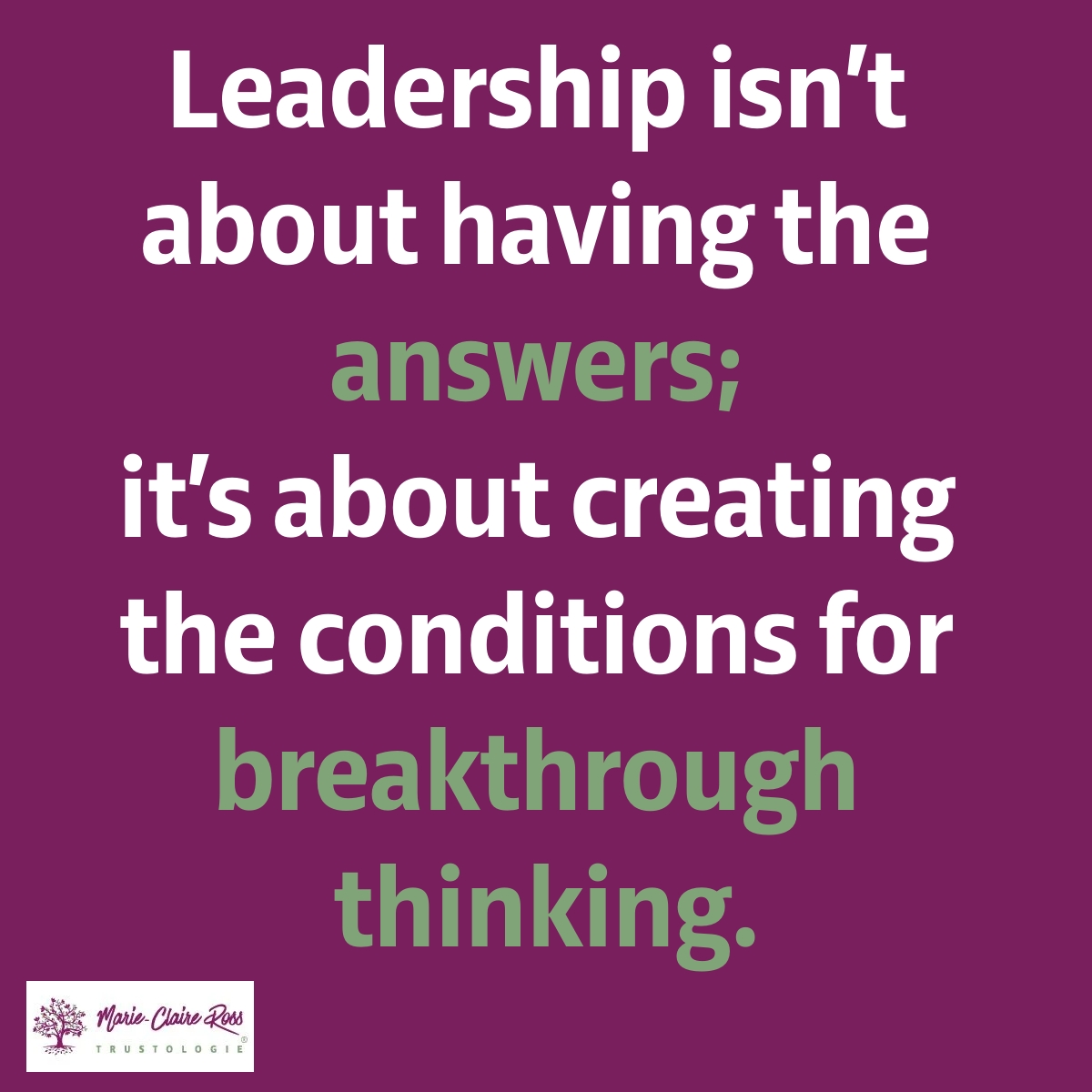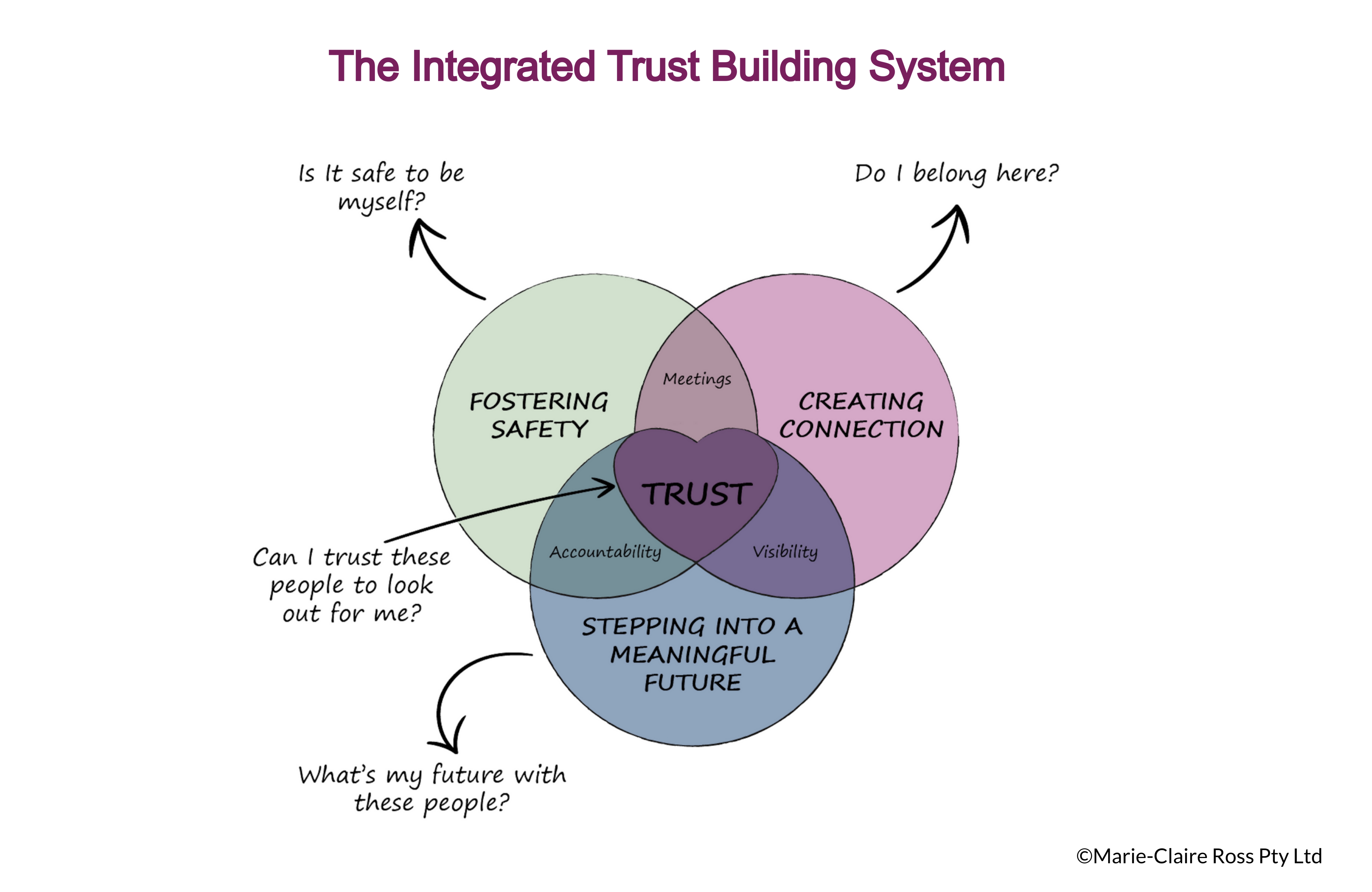8 min read
Beyond the "Why": 5 Coaching Secrets to Unlock Curiosity in Leadership
When my daughter was 17 months old, she discovered a superpower: the word “Why?”For the next two years, it was her response to almost everything.
Develop leaders, strengthen executive teams and gain deep insights with assessments designed to accelerate trust and performance.

Transform how your leaders think and perform with keynotes that spark connection, trust and high-performance cultures.

Explore practical tools, thought-leadership and resources to help you build trusted, high-performing teams.

Trustologie® is a leadership development consultancy founded by Marie-Claire Ross, specialising in helping executives and managers build high-trust, high-performing teams.

4 min read
Marie-Claire Ross : Updated on February 2, 2026

If there is one insult that a manager dreads, it would have to be being called a micromanager. It sends an implicit message of distrust, creating a vicious cycle of poor performance and high turnover.
Micromanagement often runs rampant among technical experts who feel validated by their prowess. They struggle with letting go of control because they haven't learned to train reports or communicate clearly. When things go wrong, they "step in to save the day," reinforcing the cycle.
It can also be a symptom of leaders under pressure to deliver in an environment of blame and shame. The need to get it right or be on the firing line can create a culture of micromanagement. Which is extremely damaging to morale and getting results.
If you talk to a leader who has been labelled a micromanager, they will say they have trouble dealing with the tension between attention to detail and letting things go. That they want to do the best work for clients and struggle with how to balance their expectations on people.
Such a perspective makes it hard to know what to do if you have a tendency to have high standards of work. But there is good news.
Micromanagement is not a personality or leadership flaw. It is not even a leadership training issue. It’s a failure in the basics of delegation.
In other words, it's a communication problem.
Breaking the habit of micromanagement requires a shift in mindset. It’s about learning to foster ownership rather than defaulting to control. I use a "Briefing Framework" to remove the ambiguity that usually triggers micromanaging behaviours.
Reducing micromanagement tendencies requires working on two different areas. The first part is learning about how to trust others and loosen up the reins, while the second is to learn how to delegate more appropriately.
Micromanagement is a choice. It’s up to the manager to break the habit of micromanagement and control. It involves learning to empower others to do their best work and give them the autonomy to do tasks the way they think best within some clearly specified constraints. It's about learning to foster ownership rather than default into micromanagement.
Developing the right mindset is crucial and it requires self-awareness of your own communication style. I use Enneagram when I coach leaders. It provides in-depth reports on communication style with suggested behavioural adjustments a manager can take toward a more open, positive relationship with team members.
The second part is learning how to delegate more effectively. I use what I call a briefing framework. When I left University, I started my career as a market research consultant. Every project I worked on started with a brief that stated the research objectives, methodology, client deliverables and due dates. Micromanagement was never an issue because everyone knew exactly what to do because they had a brief.
I have used this framework in all of my subsequent careers and in pretty much everything I need done in my business (including building a home!) It has never failed me.
The benefit of a brief is that it removes uncertainty and ambiguity in a task. When people don’t know what’s expected of them or get confused, they tend to go off in the wrong direction or freeze. Essentially a briefing conversation is an opportunity for open and honest two-way dialogue between the manager and direct report to get to a shared understanding of the project. Clearing away any potential derailments or confusion.
This will get you are clear on expectations - objectives, constraints, milestones, what success looks like, how they should achieve the task (with input from them) and how you’ll measure success. The goal here is to ensure you both have the same shared understanding and that they are very clear on your expectations. Avoid vagueness or fuzziness.
Schedule in time to go through the document. It should be an engaging conversation where your direct report gets to ask questions and you can check in with them to ensure they are on the same wavelength. One of the most important components is often around what good looks like.
A wonderful technique that has come up repeatedly in research that I do from stakeholders is that they want to know what pre and post success looks like. Say someone is working on a client report. The sponsor needs to define the client world now (including strengths of the situations, issues and limitations) and compare it to what their world will be like afterwards. You can also define what success looks like for them, in terms of how you’ll reward them. eg: more work, promotion or more client opportunities.
Make sure that you are not setting people up to fail (or yourself). Check in with them to make sure that they have the right level of capability and confidence. Often, delegation goes awry when managers and employees are both overly hopeful. If the work is new to them, ask them about how confident they feel about whether they have the right skills or resources? Ask them what they feel might be missing and then create a plan with them to fix any gaps. If the gaps are too big or the goal is unrealistic, delegate to someone else. Better to do that now, than regret it later. If this is your first time working with them, make sure you are not putting them on a high stakes project. Start with low risk.
Sometimes direct reports can be afraid to ask for help or an unseen issue pops up. During the briefing conversation, schedule regular check in points to ensure that they are on track. If any of their targets slip, you have time to fix it immediately with their input. With clear measurements and expectations in place, it should be easy to see if they are delivering on their commitments.
Feedback is two-way and provides a perfect opportunity for you to offer more support and advice. Asking "What can I do to help?" or "Is there anything you are stuck on?" goes a long way to ensuring they know you are there for them.
This is what a lot of leaders forget to make clear, assuming consequences are implied. But there needs to be clarity around what happens if they fail to deliver the goods on time or at the right level of quality. Ideally, it's also tied into how it will personally impact them. It might be that if they fail to get the work done well, it can impact the relationship and revenue associated with a client. The impact being that they will not be able to get stretch assignments.
Of course, if they do well at the task, you can let them know that you will reward them with opportunities to understand the business and customers better or more important work. Whatever it is, make sure they are aware of the meaning and importance of the work involved - both to customers and themselves. And don't forget to celebrate and recognise their success, if they do well.
Micromanagement often originates from the desire to do exceptional client work. But it can do a lot of damage to relationships and reduce productivity. Learning to reduce control freak tendencies and how to delegate work effectively are critical skills of high trust leaders.

8 min read
When my daughter was 17 months old, she discovered a superpower: the word “Why?”For the next two years, it was her response to almost everything.

11 min read
I have a friend who often finds herself at the mercy of her emotions. Recently, she called me to rehash a confrontation she’d had with a group of...

9 min read
True leadership presence isn’t a performance or a set of charisma hacks; it is the felt experience of who you are being in the room. By cultivating...

We have all heard of micromanagement - and how negative it can be to building trust in teams. But what about under-management?

Trust is often easy to build within teams.

Despite the potential threat of the horrific death of their friend, and possible manslaughter charges, four unlikely accomplices worked tirelessly...